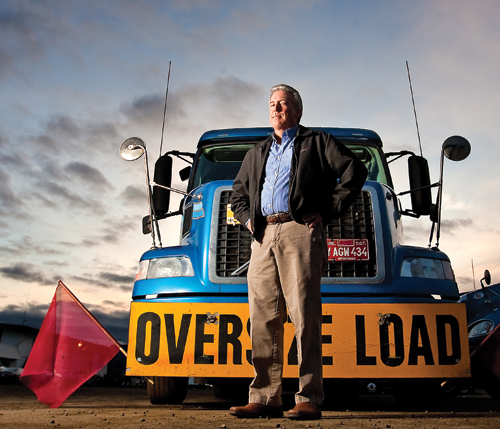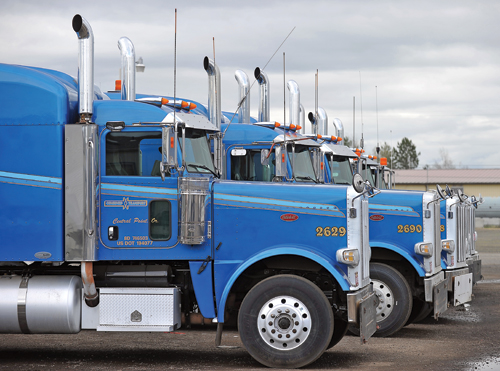 Think trucks are smelly, polluting dinosaurs crowding the nation’s highways? Think again, says Mike Card, president of Central Point-based Combined Transport.
Think trucks are smelly, polluting dinosaurs crowding the nation’s highways? Think again, says Mike Card, president of Central Point-based Combined Transport.
BY STEVE WARGA
 |
// Photo by Jamie Lusch |
Think trucks are smelly, polluting dinosaurs crowding the nation’s highways? Think again, says Mike Card, president of Central Point-based Combined Transport. “I don’t believe the general public understands how important the industry is to commerce,” says Card, a second-generation owner who presides over one of the largest Oregon-based trucking outfits. Card says 85% of the state’s communities are served exclusively by truck: no air, no pipelines, no rail. “The most efficient way to do business today is to have low inventories resupplied by timely and affordable deliveries via trucks,” he observes. “Otherwise you have to increase inventory costs, which means [raising] prices.”
Thanks to a one-year turn as chairman of the American Trucking Association in Washington, D.C., Card, 54, has an international platform for spreading the gospel that trucks move the world. But he’s quick to say the trucking lobby needs to do a better job of getting that message across. “People see our trucks as impediments on the highway,” he says. “That’s a shame. We need to change our industry’s image.”
One by one, Card addresses prevailing industry myths and realities. Theoretically, trains can haul more freight with less pollution than trucks can, he says. “But anytime you want to replace trucking with rail, you can’t do it. Rail doesn’t go to the grocery store or the gas station, and it never will.” Except for bulk commodities like coal or grain, trucks are the only form of transportation capable of delivering life’s daily necessities, Card insists. “The toilet paper and the T-shirts you buy? They all got there by truck.”
 |
President: Mike Card Employees: 550 Annual revenue 2012: $127M Factoid: 85% of Oregon communities supplied exclusively by trucks |
As for his industry’s contribution to pollution, Card acknowledges that many trucking companies still gripe about emissions reductions imposed by the Environmental Protection Agency in 2007. “But I think [the rules] have been great,” he says. “I tell people that the air coming out of our trucks running in Los Angeles is cleaner than the air going in for nitrogen oxide, sulfur and particulates. It’s good for the industry that we cleaned up our engines.”
Card’s advocacy dates back to the 1980s, when his father, Richard, joined the ranks of “deregulation babies” who seized the opportunity to establish their own trucking companies after President Jimmy Carter signed the Motor Carrier Act of 1980, which opened the industry to more competition. Card and brothers David and Jon, plus stepbrother Ron Moore, worked with Richard to build Combined Transport into a company that now has 550 employees operating 450 trucks across North America and into parts of Mexico.
By the company’s 30th anniversary in 2010, Combined Transport trucks had logged over 2 billion miles. Last year Combined finally shook off the aftereffects of the 2007 recession as 2012 annual revenues jumped 25% over the previous year to $127 million. Card now sees good times ahead for his company and the industry. “It’s an exciting time,” he says. “We have to turn down loads because we can’t hire enough drivers.” Just as he urges other companies to do, Card is keeping an eye out for first-generation companies looking to sell. “A lot of those trucking companies that started in the ’80s are just now coming into retirement and don’t have a second generation to carry them.” In the next five years, merger and acquisition activity will increase, Card predicts.
Card himself intends to follow an M&A plan he’s been perfecting since 2000, when Combined made its first acquisition. It’s a plan that is in keeping with his efforts to burnish the industry’s reputation. “We don’t want to bottom-feed just to get equipment and drivers,” he says. “That doesn’t work. When we find a company that has a good business model, we’re going to let them keep that model with employees and management structure in place and run them as a wholly owned subsidiary.”
A case in point: In 2012 Card purchased friend Mike Simone’s Blackwell Consolidation (formerly Cross Creek Trucking). The purchase included Blackwell’s 31-acre parcel of land situated within shouting distance of Interstate 5, solving a problem that’s vexed Card for years. “Moving operations over there is really going to help the Rogue Valley,” Card says. “We’ll eliminate over 50,000 truck miles by being that much closer to I-5. We won’t be clogging the two busiest intersections in the Valley, and we estimate saving over a quarter ton of pollution from the air shed.”
This is just another way of giving back to the state Card holds dear. As ATA chairman, Card preaches respect, professionalism and safety on the road. Back at home, he’s an equally vocal cheerleader for Oregon economic development. “I love it here,” he enthuses. “I was born and raised in Medford. Everyone in the trucking industry knows I’m from Oregon. I make a big deal out of it because I think it’s the best place in the world to live.”



